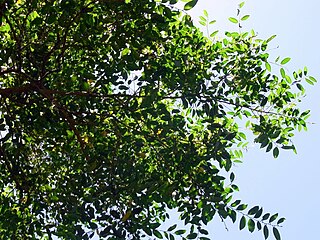
Camellia sinensis is a species of evergreen shrub or small tree in the flowering plant family Theaceae. Its leaves, leaf buds, and stems can be used to produce tea. Common names include tea plant, tea shrub, and tea tree.

Glochidion is a genus of flowering plants, of the family Phyllanthaceae, known as cheese trees or buttonwood in Australia, and leafflower trees in the scientific literature. It comprises about 300 species, distributed from Madagascar to the Pacific Islands. Glochidion species are used as food plants by the larvae of some Lepidoptera species including Aenetus eximia and Endoclita damor. The Nicobarese people have attested to the medicinal properties found in G. calocarpum, saying that its bark and seed are most effective in curing abdominal disorders associated with amoebiasis.

Endoclita is a genus of moths of the family Hepialidae. There are 60 described species found in eastern and southeast Asia and the Indian subcontinent.
Glochidion bourdillonii is a species of plant in the family Phyllanthaceae. It is endemic to Kerala in India.
Glochidion hohenackeri var. johnstonei is a variety of flowering plant in the family Phyllanthaceae. It is a tree or shrub endemic to southwestern India.
Glochidion manono, also known as manono or mahame in Tahitian, is a species of shrub or small tree in the family Phyllanthaceae. It is endemic to the Windward Society Islands in French Polynesia, where it is found on the islands of Tahiti and Moorea. Compared to other species of Glochidion in the Society Islands, G. manono is found in relatively low-elevation areas, including some disturbed environments.

Glochidion candolleanum is a species of flowering plant in the family Phyllanthaceae. It is a tree native to Sri Lanka and southern India.
Glochidion zeylanicum var. tomentosum is a variety of flowering plant in the family Phyllanthaceae. It is native to tropical and subtropical Asia, ranging from India and Sri Lanka to the Himalayas, Myanmar, Thailand, and southern China to Taiwan and the Ryukyu Islands.

Glochidion ferdinandi, with common names that include cheese tree, is a species of small to medium–sized trees, constituting part of the plant family Phyllanthaceae. They grow naturally across eastern Australia, from south–eastern New South Wales northwards to northern and inland Queensland, in rainforests and humid eucalypt forests. Frugivorous birds such as pigeons, figbirds and parrots consume its fruit. The tree roots and branches are toxic to dogs, causing liver failure and death.

Nymphaea nouchali, often known by its synonym Nymphaea stellata, or by common names blue lotus, star lotus, red water lily, dwarf aquarium lily, blue water lily, blue star water lily or manel flower, is a water lily of genus Nymphaea. It is native to southern and eastern parts of Asia, and is the national flower of Bangladesh and Sri Lanka. In Sanskrit it is called utpala. This species is usually considered to include the blue Egyptian lotus N. nouchali var. caerulea. In the past, taxonomic confusion has occurred, with the name Nymphaea nouchali incorrectly applied to Nymphaea pubescens.

Arthraxon, commonly known as carpetgrass, is a genus of Asian, African and Australian plants in the grass family, Poaceae, containing the following species:

Epicephala is a genus of moths in the family Gracillariidae.
Acrocercops strophala is a moth of the family Gracillariidae. It is commonly found in India, Indonesia (Java), Samoa, Guadalcanal and Sri Lanka.

Glochidion zeylanicum var. zeylanicum, known as the umbrella cheese tree, is a plant in the family Phyllanthaceae. It is native to northern and eastern Australia, New Guinea, the Solomon Islands, Vanuatu, Indonesia, Indochina, southern China, Taiwan, Japan, and the Indian subcontinent. It is recognized as a distinct species by some sources, as Glochidion sumatranum and other synonyms. The habitat is rainforest, or rainforest margins in swampy areas, sometimes associated with palms. It may grow to 15 metres tall. The most southerly point of natural distribution is Iluka, New South Wales.

Endoclita damor is a species of moth of the family Hepialidae. It is known from India and the Himalayas. Food plants for this species include Albizia, Altingia, Cinchona, Coffea, Erythrina, Eugenia, Glochidion, Manglietia, Nyssa, Schima, Tectona, Tetradium, and Theobroma.

The Tubuai tropical moist forests is a tropical and subtropical moist broadleaf forests ecoregion in French Polynesia. It covers the Austral Islands.

Phalaenopsis difformis, also known as the dark brown Phalaenopsis, is a species of epiphytic orchid native to Assam, Borneo, China South-Central, China Southeast, East Himalaya, Laos, Malaya, Myanmar, Bangladesh, Nepal, Sumatera, Thailand, Vietnam and West Himalaya.

Glochidion zeylanicum is a species of flowering plant in the family Phyllanthaceae. It is a shrub or tree which ranges from the Indian subcontinent through Indochina, southern China, Taiwan, Japan, Malesia, and Papuasia to northern Australia and Vanuatu.












